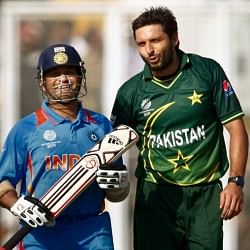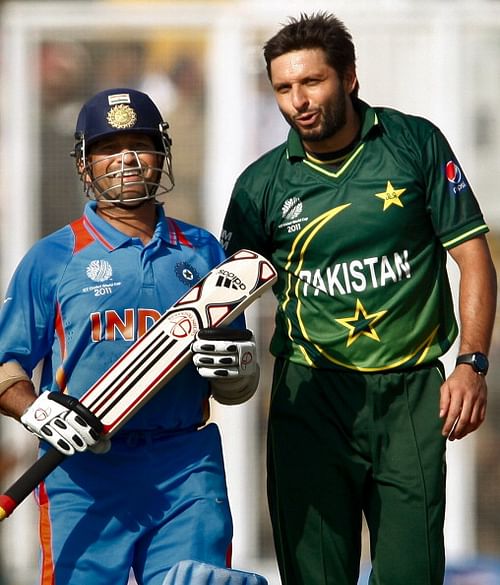
Master's majesty and all things Afridi: Where the twain meet

Sachin Tendulkar of India (L) and Shahid Afridi of Pakistan exchange words after Tendulkar was dropped by Younis Khan off Afridi’s bowling during the 2011 ICC World Cup second Semi-Final between Pakistan and India at Punjab Cricket Association (PCA) Stadium on March 30, 2011 in Mohali, India.
Sue me if you must, but mentioning Sahibzada Mohammad Shahid Khan Afridi and Sachin Ramesh Tendulkar in same breath, even if that implies a slight bit of comparative analysis albeit not so much in statistical terms, makes for an exciting cricketing catharsis. The ‘affront’ is audacious, but that doesn’t dissolve the embedded ecstasy the prospect of pitting Afridi against Tendulkar brings.
How often has the prospect regaled us? How often, like a slow, low rising scent in a musty chamber has it engulfed us in its sinuous, sensuous maneuvers, slowly rising through our skin, into our senses, until a steady crescendo builds up in the convoluted layers of our cerebral spheres? How often have they forced jet lagged men and women out of their stupor, coerced drumbeats to raise their utterings by a few decibels and countless fans to shout out loud just when they believed they have lost their voices, literally and metaphorically?
How often have we, in mind’s eye at least, stood up to applaud their successes, even if that means inviting ‘patriotic’ pandemonium? The Pathan from Khyber Agency has been cricket’s perennial 18-year-old, which to a degree, explains our obsession over him. Ever since he burst on to the scene with a record smashing effort, cricket world has embraced him with the knowledge that he will hurt it in the face like an erratic baby fiddling and fidgeting in a caring lap. To his credit, Afridi has never disappointed. He has rubbed PCB the wrong way, riled the opposition, captained, retired, came back, bit the ball, bit the dust, hit the ball, and hit them hard. In between, he has shared some quintessential Punjabi camaraderie with fellow freaks Yuvraj Singh and Virender Sehwag, and quite like his Indian counterparts, has never been short of respect for the little man.
In the World Cup of 2003, when Tendulkar was unstoppable, Afridi threw a verbal volley at him. Some silken drives and a few audacious paddle sweeps followed from the MRF willow; India thanked the two. Eight years down the road, in Mohali, after a nervous bunch repeatedly dropped an uncharacteristically scratchy Tendulkar off his bowling, Afridi chose to see the funny side of it. The image of a smiling Tendulkar, knowing fully well that he had been outsmarted for once, going past a grinning Afridi, who presumably had a friendly advice for him, makes for perennial stress buster.
Later, after India had managed to maintain its clean slate against Pakistan in World Cup games, Afridi led his side for the customary handshake and spent that extra moment with Tendulkar. The freeze frame said a story. It still does. Earlier in the day, Afridi had been warmer than the unforgiving Mohali sun in introducing his side to the Indian Prime Minister. As he took Manmohan Singh’s age-scarred hand in his monstrous, battle-hardened palm, many in India cringed for their genial Premier. Afridi, surprisingly, was gentler than expected. He looked at the Sikh with a kind of reverence Pathans reserve for the elderly. While MS Dhoni was admittedly cosmetic in extending courtesies, skipper Afridi was eagerness in entirety.
Come World T20, cricket will miss the theatre. While Afridi’s track record in World T20s is indisputable – a record 9 Man-of-the-Match awards give enough credence to his ‘Boom Boom’ badge – Tendulkar has surged in ODI World Cups with recurring regularity. The set of connoisseurs who believe Afridi would have been an ODI legend had he used his head along with his muscle, also believe that Tendulkar, had he played T20s in his prime, would have outscored, if not overpowered, Gayle and Co.
The deafening and defining gap between their cricketing achievements notwithstanding, Afridi and Tendulkar have given joys to us that transcend nations, nationalities and nationhood with incredulous ease. While Afridi has managed to reconcile hopes of an imploding nation with his explosive batting and raw, tribal appeal, Tendulkar, with significant waftures of his wood, stopped the clock and turned it, too.
When he steps out to bat, many in Pakistan give up their beliefs and cling on to their hopes. They hope he does not self-destruct; they believe he will. They hope he grows up, for once; they believe he won’t, ever. They hope he doesn’t walk blind-folded on a highway; they believe he will run into incoming bulldozers, results be damned. They believe there’s light at the end of the Afridi tunnel, just as they hope it’s not of an incoming train. True to his nature, Shahid Afridi seldom disappoints. Adept at walking the precipice, he does a remarkable tightrope between genteel hopes and craggy beliefs.
It has always been a bit different with Tendulkar. He has forever been a finished product. An ideal master and an exemplary servant. A fine child and a doting dad. An earnest student and a marvelous tutor. A run machine and an excellent orator (remember his tearjerker of a farewell speech). He defined a nation and its character, at times becoming the national character itself. He coalesced us when we seethed in post-Babri simmer. He calmed us when balance of payment (BoP) tanked our economy. He helped us smile when 26/11 burnt his backyard. To India, the cult of Sachin Tendulkar extends beyond 22 yards that he mastered and served for 24 years. Just as India will never have hope in flesh and blood, Pakistan, sooner than later, may see the back of its biggest belief.
Savour it as long as it lasts.